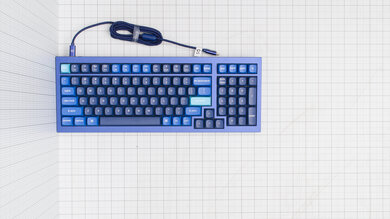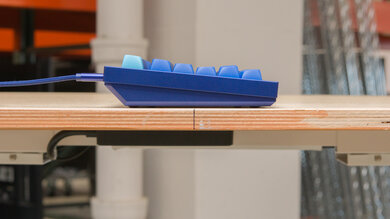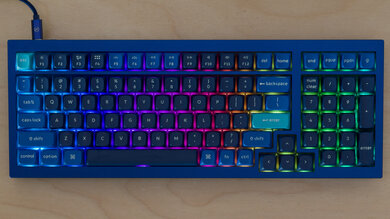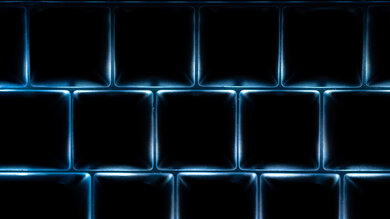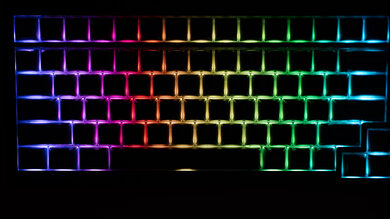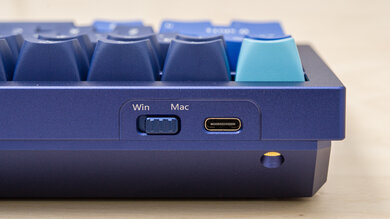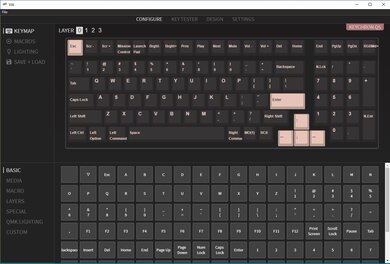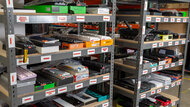The Keychron Q5 is the fifth installment of Keychron's customizable Q-series. It retains the same gasket-mounted design, hot-swappable PCB (printed circuit board), screw-in stabilizers, and specialized, rounded PBT keycaps found on all the other Q-series boards. It also comes with an included toolkit to make customization easy. The key difference is the size, as the Q5 comes in a full-size (96%) form factor with a Numpad and a full row of dedicated function keys.
Our Verdict
Despite not being designed for this use, the Keychron Q5 is an excellent keyboard for gaming. It feels incredibly well-built thanks to the premium materials used in its construction, and using it feels very satisfying. Using the companion software, you can program macros to any key, adjust the RGB backlighting, and remap buttons. As it's a hot-swappable keyboard, you can pop in your favorite gaming switches without having to solder. However, its latency is too high for competitive gaming, and it can get uncomfortable after a while since it has a high profile and doesn't come with a wrist rest.
-
Incredible build quality.
-
All keys are macro-programmable.
-
Hot-swappable PCB.
-
Full RGB backlighting with individually-lit keys.
-
High-profile design feels uncomfortable without a wrist rest.
-
Latency is too high for competitive gaming.
Since the Keychron Q5 is a wired-only keyboard, it isn't suitable for use with mobile devices. However, it connects using a USB-C to USB-C cable, so technically, you can use it with mobile devices with a USB-C port, though this will drain the battery faster.
The Keychron Q5 is a very good keyboard for office use. It feels incredibly well-built with premium materials and offers an excellent typing experience right out of the box. Thanks to the layers of sound-dampeners inside the board, it's very quiet to type on and well-suited to open office environments. Also, its companion software is available on all major operating systems. Unfortunately, it can get uncomfortable to type on after a while as it has a high profile and doesn't come with a wrist rest.
-
Incredible build quality.
-
All keys are macro-programmable.
-
Hot-swappable PCB.
-
Full RGB backlighting with individually-lit keys.
-
High-profile design feels uncomfortable without a wrist rest.
-
Wired-only.
The Keychron Q5 is a very good keyboard to use for programming. It feels incredibly well-built, thanks to the premium materials used in its construction. Impressively, its software is available on all major operating systems, including Linux. Using the companion software, you can adjust the RGB backlighting, remap keys, and program macros to any key. Unfortunately, as this is a wired-only keyboard, you can only connect it to one device at a time. Also, it has a high profile and doesn't come with a wrist rest, which would improve the comfort.
-
Incredible build quality.
-
All keys are macro-programmable.
-
Hot-swappable PCB.
-
Full RGB backlighting with individually-lit keys.
-
High-profile design feels uncomfortable without a wrist rest.
-
Wired-only.
The Keychron Q5 is a poor keyboard to use with a home theater PC setup. Since it's wired-only, you'd have to run a cable across your setup to connect the board to the PC. Plus, it lacks a trackpad for on-screen navigation, so you'll have to use another peripheral. Though there's full RGB backlighting, the key legends aren't shine-through, so you may have difficulty reading them in the dark.
-
Incredible build quality.
-
High-profile design feels uncomfortable without a wrist rest.
-
No trackpad for on-screen navigation.
-
Wired-only.
- 8.5 Gaming
- 3.2 Mobile/Tablet
- 7.8 Office
- 8.1 Programming
- 5.1 Entertainment / HTPC
Changelog
- Updated Apr 04, 2023: We've added mention of the newly-reviewed IQUNIX F97 in the Keystrokes section of this review.
- Updated Sep 02, 2022: Updated the "White Shot" image to better reflect real-life color mixing observations. This result has changed accordingly. Also updated Linux compatibility as this keyboard is fully compatible with this system. The review now shows these changes.
- Updated Jul 13, 2022: Review published.
- Updated Jul 04, 2022: Early access published.
- Updated Jun 29, 2022: Our testers have started testing this product.
Check Price
Differences Between Sizes And Variants
The Keychron Q5 comes in different configurations, listed in the table below. The barebones versions don't include keycaps or switches, whereas the fully assembled versions come with your choice of switches and colorways. The version with a knob has a rotary knob in the top right corner and includes your choice of keycaps in two different styles, labeled A and B. The A colorway has lighter-colored alphanumeric keys, while the B colorway has darker-colored alphanumeric keys. We bought and tested the fully assembled, knobless version in Navy Blue with Gateron G Pro Brown switches installed. While we normally include a label photo, this unit doesn't have one.
| Type | ISO Layout Available | Color | Gateron G Pro Switches |
|---|---|---|---|
| Fully Assembled | No | Carbon Black, Silver Grey, Navy Blue (dark keycaps only) | Red, Blue, Brown |
| Fully Assembled Knob | No | Carbon Black, Silver Grey, Navy Blue (light or dark keycaps) | Red, Blue, Brown |
| Barebone | Yes | Carbon Black, Silver Grey, Navy Blue (no keycaps) | No switches |
| Barebone Knob | Yes | Carbon Black, Silver Grey, Navy Blue (no keycaps) | No switches |
Compared To Other Keyboards
The Keychron Q5 is the fifth entry into Keychron's Q-series of customizable keyboards, but it marks the first keyboard in this lineup to have a full Numpad. Like the rest of the Q-series, this board is designed to be easily customized and altered to your liking. It includes a full set of tools to help you achieve this. It has a hot-swappable PCB, screw-in stabilizers, and plenty of premium parts built into the board, so you don't have to spend too much money upgrading the keyboard. While its latency is decent enough for casual gaming and productivity tasks, it's a bit too high for competitive or fast-paced games.
If you're interested in looking at other options, check out our recommendations for the best keyboards for typing, the best mechanical keyboards, or, if you're looking for another Keychron model, the best Keychron keyboards.
The Keychron Q6 and the Keychron Q5 are both customizable keyboards in Keychron's Q-series. They have nearly identical build qualities, features, and appearances. However, they are slightly different sizes. The Q6 is a full-size (100%) keyboard, while the Q5 is a compact (96%) keyboard.
The Keychron Q3 and the Keychron Q5 are both customizable boards in the Q-series. They're nearly identical in performance, with the biggest difference being the size. The Q3 is a TKL (80%) board, so it lacks a numpad, while the Q5 is a full-size (96%) board, so it has the numpad but loses a portion of the navigational cluster.
The Keychron Q1 and the Keychron Q5 are both customizable keyboards in the Q-series. They have a few main differences as the Q1 was the initial release in the lineup, and the design of the Q-series has changed since the release. The Q5 better reflects these changes, which include rounded PBT keycaps, an additional gasket for better feel and sound absorption, and a regular USB-C to USB-C cable as opposed to the coiled aviator cable included with the Q1.
The Keychron Q5 and the Keychron Q5 Max are mechanical keyboards with 96% form factors. Each keyboard also belongs to wider respective Q and Q Max lineups with other size variants available. The biggest difference between these lineups is that the Q series are wired-only models while the Q Max series are wireless models that you can connect via Bluetooth or a 2.4GHz receiver. Both keyboards have layers of sound-dampening material inside the case, but the Q Max series keyboards have several additional layers the standard Q series boards lack.
The GLORIOUS GMMK 2 and the Keychron Q5 are two full-size (96%) customizable keyboards designed with different uses in mind. The GLORIOUS caters to a more gaming-oriented crowd and has significantly better latency, while the Keychron is better designed as a hobbyist or typist keyboard, so it has a more premium build quality and includes a small toolkit to help you customize the keyboard.
The Ducky One 3 and the Keychron Q5 are wired-only, customizable mechanical keyboards with some notable differences. The Ducky has more of a traditional keyboard design with a plastic frame and two incline settings, while the Keychron has a more premium gasket-mounted design with an aluminum frame and a fixed incline. The Ducky lacks companion software for tweaking any of the settings, while the Keychron's companion software is available on every major PC operating system.
The IQUNIX F97 and the Keychron Q5 are mechanical keyboards with Compact (96%) form factors. The IQUNIX F97 is a wireless model that you can connect with a USB receiver or via Bluetooth with up to three devices simultaneously. On the other hand, the Keychron is wired-only and designed with more hardware customizability in mind. It also offers a slightly better typing experience due to its premium-feeling gasket-mounted design. The Keychron has several smaller variants in its Q Series lineup, while the IQUNIX is only available as a compact (96%) model.
Test Results
The Keychron Q5 is a full-size (96%) keyboard, so it has a Numpad but lacks a portion of the navigational cluster found on full-size (100%) keyboards. For a full-size (100%) version very similar to this keyboard within the same lineup, check out the Keychron Q6.
The Keychron Q5 has an incredible build quality that's similar to the other keyboards in Keychron's Q-series. The chassis is solid aluminum, while the baseplate is solid steel, so the keyboard exhibits no flex. It's also quite heavy, which helps keep it in place on your work surface, along with the four rounded rubber feet for grip. It has a gasket-mounted design with two layers of sound-dampening foam inside to improve the acoustics and feel. The keycaps are double-shot PBT with a smooth texture that feels nice on the fingertips. They also have a unique profile that tapers to a rounded top, which Keychron calls an "OSA" profile. Additionally, this keyboard is hot-swappable, and you can see a close-up shot of the unit without keycaps here.
The Keychron Q5 has mediocre ergonomics. Like the other Q-series boards, it has a high profile with a fixed incline, meaning you have to tilt your wrists upwards to reach the keys, which can cause discomfort over long periods. It doesn't come with a wrist rest to help alleviate some of that discomfort, but Keychron offers them on their website as a separate purchase.
The Keychron Q5 has individually-lit RGB backlighting. The LEDs are south-facing, so they're compatible with Cherry keycaps if you want to replace the stock keycaps. The legends aren't shine-through, but you do get enough illumination while seated in front of the board to read the keys. You can customize the RGB backlighting using the companion software to change the brightness, colors, effects, and effects speed. Unfortunately, the color mixing is poor as the white backlighting has a blue tint to it.
The Keychron Q5 comes with a USB-C to USB-C braided cable and a USB-C to USB-A adapter. The length measurement above includes the length of this USB-A adapter (2.1cm). Though the cable keeps kinks from its packaging, its quality feels good.
The Keychron Q5 is a wired-only keyboard.
The Keychron Q5 has few extra features. Like other Keychron boards, it has a switch on the top left to toggle between Windows and macOS modes. Like the Keychron Q4, this keyboard also has a Caps Lock indicator which was missing on some earlier Q-series boards. The media keys are hotkeys accessible in the function row. The user documentation also outlines the RGB hotkeys to make on-the-fly adjustments to the lighting effects, colors, and brightness. Also, this keyboard is hot-swappable, meaning you can change the stock switches for any 3-pin or 5-pin switch you want.
The pre-assembled version of the Keychron Q5 comes with your choice of Gateron G Pro switches in linear Red, clicky Blue, or tactile Brown. This keyboard is also hot-swappable, meaning you can change the stock switches out for most 3-pin or 5-pin switches without having to solder. The Gateron G Pro Brown switches come pre-lubed, providing a smoother feeling during the keypress. There's a distinct tactile bump, but it doesn't take much force to get over, so typing feels light. These switches also have a long pre-travel distance, which helps to reduce typos. If you're interested in a keyboard with a similar form factor and typing quality but with more stock switches available, check out the IQUNIX F97.
The Keychron Q5 provides an excellent typing experience. The double-shot PBT keycaps have a nice, smooth texture that feels good on the fingertips. They also have a unique shape, which Keychron calls an OSA profile, meaning they have a similar height to a standard (OEM) keycap, but it tapers off to a rounded top. There's a slight wobble in the modifier keys, but it's not distracting during use. Since this is a full-size board, the keys don't feel too cramped together, and they have a standard layout that doesn't take much getting used to. Inside the board, the tactile Gateron G Pro Brown switches feel light, meaning you won't feel any finger fatigue. However, this keyboard has a high profile and doesn't come with a wrist rest, which would improve the comfort as you're more prone to wrist fatigue during long use sessions.
With the Gateron G Pro Brown switches, typing on the Keychron Q5 is very quiet. Inside the board, there are two layers of sound-dampening foam to improve the acoustics and keep the typing noise to a minimum. However, the typing noise varies depending on the switches, so if you opt for a clicky Blue switch, it'll be louder.
The Keychron Q5 has decent latency. It's low enough for casual gaming or daily use but isn't fast enough for competitive genres.
The Keychron Q5 uses the VIA companion software and supports QMK firmware. The software and all corresponding files are available for download directly on Keychron's website. Using the software, you can remap keys, set macros, and customize the RGB backlighting. You have four layers of key customization. Layers 0 and 1 are Mac-specific, and layers 2 and 3 are for Windows. To access these layers, you'll need to ensure the OS toggle is set correctly.
The Keychron Q5 has very good compatibility. It's fully compatible with Windows, macOS, and Linux as long as the toggle on top of the board is set to the correct operating system. For Linux users, the toggle should be set to "Mac Mode" for compatibility. The VIA companion software is available on all three major operating systems.
Although this is a wired-only keyboard, it comes with a USB-C to USB-C cable, so you can technically use it with any mobile device that has a USB-C port. On Android, all keys work as intended. However, as not all mobile devices have a USB-C port, it's considered not compatible.
Comments
Keychron Q5: Main Discussion
Let us know why you want us to review the product here, or encourage others to vote for this product.
Update: We uploaded the latest brightness measurements and uniformity photos for the Accelerated Longevity Test.


